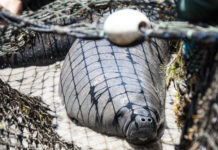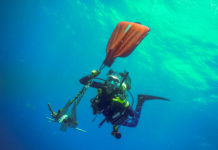
A new federal law requiring use of engine cutoff switches is setting out to prevent runaway boats and injuries in instances when the operator is separated from the helm.
The law that took effect a few months ago applies to recreational vessels, but not all. It specifically targets boats that are manufactured after January 2020, have 3 horsepower or more, and are less than 26 feet in length. Vessels with an enclosed cabin helm and those built before January 2020 aren’t required to have an engine cutoff switch.
Fines are $100, $250 and $500 for the first, second and third offenses of the new law, which applies to all navigable waters of the U.S.
If vessels fit that category, operators must have an engine cut-off lanyard clipped to themselves. It’s usually a coiled bungee cord lanyard that’s looped around the wrist or attached to clothing. The cord is attached to the boat’s cut-off switch.
When an operator wears a link while underway, the engine will cut off if the operator is separated from the operating area, which can happen if the operator is tossed from the helm.
Injuries and deaths stemming from operators being ejected have been seen on the Florida Keys waters. In July 2020, a 25-year-old was killed after he was thrown from his boat and struck by the vessel’s propellers. Last May, a 58-year-old Key Largo man traveling at high speed in Blackwater Sound was thrown from his vessel into the mangroves. He died from his injuries.
According to the U.S. Coast Guard, shutting down the engine prevents the operator or others on the boat from being struck by a propeller in the event they’re thrown from the vessel. It also can assist the operator in safely returning to the drifting vessel.
The new law comes following a 2020 recreational boating year that saw 804 boating accidents and 72 deaths in Florida. That’s up from 679 accidents and 62 deaths the previous year. Nationwide, accidents increased by 26 percent from 2019 to 2020 — a pandemic contributing to more activity on the water.
The Coast Guard is urging boaters to be responsible on the water, and that includes wearing a life jacket, taking a boating safety course and attaching the engine cut-off switch. Verne Gifford, chief of the U.S. Coast Guard Boating Safety Division, said Americans are injured and killed in boating accidents every year, and they could have easily been prevented.
“This new rule is intended to make the use of these life-saving devices second nature for boaters, just as seat belt laws have for motorists,” he said.
An earlier law, passed by Congress in 2018, required manufactures to install an emergency engine cut-off switch. Even though it is now a law, most U.S. boat manufacturers have voluntarily installed engine cutoff switches on their boats for decades.
According to the U.S. Coast Guard, a typical three-blade propeller running at 3,200 rpm can inflict 160 impacts in one second, so it is critical that you are aware of what is going on around you.





















